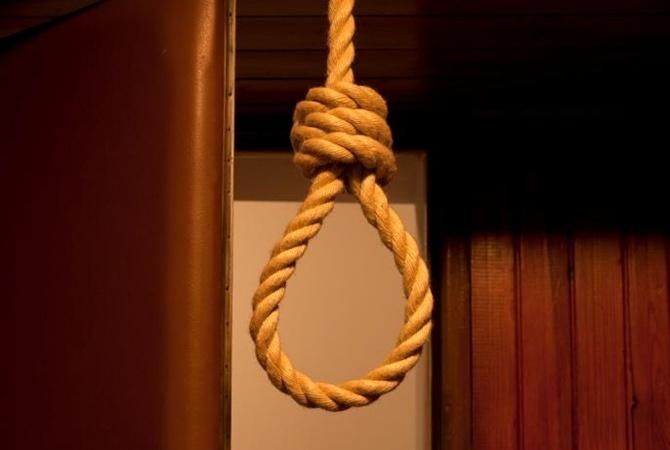
There are iconic images that grace many national flags. The maple leaf for Canada. The Union Jack. The Stars and Stripes are just some of the few. Every national flag bear icons telling a story about the country, its history and its people.
In the case of the Iranian regime, it may be time for it to redefine its national flag with a new symbol; one that has come to symbolize one of the most prolific acts committed by its government.
A hangman’s noose.
Iran ranks among world leaders in state-sponsored executions, especially of political, ethnic and religious prisoners. It’s preferred
But as the mullahs in Tehran have experiencing an unprecedented level of domestic protest and international pressure as a result of renewed U.S. sanctions, as well as gross mismanagement of the economy and the redirection of billions in hard currency to fund several wars and insurrections, they have turned to using executions as a means of harsh crowd control.
The latest example came in the execution of a gold dealer known as the “Sultan of Coins” in a blatant warning to Iranian merchants and businesses not to do anything to undermine the regime’s policies in the face of growing economic distress.
Vahid Mazloumin was sentenced to death in October after being accused by Iranian authorities of contributing to price hikes by hoarding gold. His assistant, Mohammad Esmail Qassemi, was also hanged last week, state-run Iranian Students News Agency said.
The killings came in the wake of a national currency which has fallen into a steady death spiral of devaluation; dropping a stunning 70 percent against the dollar, fueling massive surges in prices for good and leading to a widespread underground and illegal market in trading.
Mazloumin didn’t hold a permit to trade gold and foreign currency, yet had formed the largest illegal network in that area, according to state-run Fars news agency. He instructed his team to corner the gold coin market to resell at higher prices, amassing about 2 tons of them, local media said.
Whether or not it’s true or was simply something manufactured by the regime in order to set a stiff example, the truth at the core of the hangings is the mullahs’ desperate efforts to hang onto control of a deteriorating economic situation and widespread public unrest.
In an effort to restore calm and project a sense of order, the mullahs have repeatedly threatened to take harsh measures against anyone “disrupting the economy” while promising to provide assistance to the poor, according to Bloomberg.
Last week, Tehran police instituted large scale raids in which security forces arrested about 130 illegal currency traders in recent days.
In further measures to placate the deeply distressed Iranian people and lessen the pain of rising prices, president Hassan Rouhani’s government started providing benefits for the neediest to help pay for food packages that include meat, cooking oil and dairy. Parviz Fatah, who heads the state-controlled Imam Khomeini Relief Foundation, said the program will initially reach 2.7 million Iranians after its launch last Tuesday.
Top mullah Ali Khamenei said in a speech that Iran “can solve its economic problems by correctly using its domestic resources”; a not too subtle threat to any Iranian that circumvents policies to keep the regime afloat.
The executions drew harsh criticism from human rights groups that have long decried the use of “kangaroo trials” used by the regime to summarily sentence and imprison large numbers of Iranians and dual-nationals, notably British, Canadian and American citizens.
“Iran’s hanging of people who have been convicted in courts without a fair trial is a blatant violation of law,” said Hadi Ghaemi, executive director of the Center for Human Rights in Iran, describing the trial venues as “kangaroo courts”.
Amnesty International called the trial “grossly unfair”.
“In Iran, unfortunately, instead of punishing the main elements of systematic corruption, they punish and execute persons who are not important,” said Mahdi Khalili, a “reformist politician” and political scientist in Tehran. “The main ones are free from any problems or punishment.”
Iran ranked 130 out of 180 countries in Transparency International’s 2017 corruption index, demonstrating that the regime’s judicial system is anything but just.
Human rights specialists and jurists, including Iranian Nobel Peace Prize winner Shirin Ebadi, have said the suspects were condemned to death in quick trials that were unfair and failed to measure up to Iranian law much less international standards, which include a thorough appellate review process for death sentences.
Among other irregularities, the courts apply secretive national security rules to cases of white-collar crime, restricting the ability of defendants to get a lawyer, according to the Independent.
“The prosecutions suggest Tehran is attempting to shift blame for the collapse of the country’s currency to low-level traders and grey market businessmen in an effort to deflect from the Iranian system’s own incompetence and corruption, rooted in the economic power of religious charities and ideologically fervent security branches, especially the Revolutionary Guard,” wrote the Independent.
“It also shows what many critics have described over the years as the arbitrary nature of justice under the Islamic republic, where prominent members of ethnic and religious minorities as well as the Shia Muslim majority, and dissidents as well as businessmen, can become entangled in an obscure, Kafkaesque legal system overseen by Islamic jurists under the sway of shadowy security enforcers,” he added.
What is notable with these new executions was the silence coming from the Iran lobby, especially groups such as the National Iranian American Council which ostensibly is supposed to advocate for the better treatment of Iranians.
It’s too bad that doesn’t seem to apply to those who actions undermine the regime’s efforts to stay in power.
Laura Carnahan